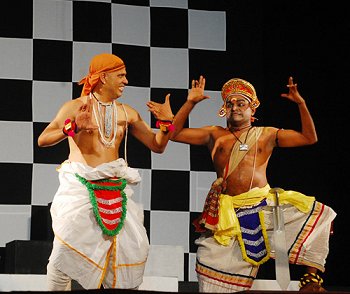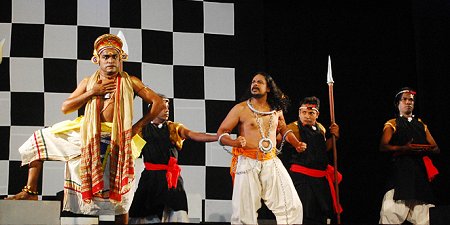
Mudrarakshasam
- Padma Jayaraj, Thrissur
e-mail: padmajayaraj@gmail.com
Photos: GB Kiran
January 20,
2009
Penned by
Visakadatta in the 6th c AD, Mudrarakshasam is the only political play
in Sanskrit. Directed by Jose Chiramel in the 1980s, it was noticed for
its energy, and for his introduction of gestures and signs from traditional
sources. The same cast presented the play, as a tribute to the young director
of high caliber who is no more, in the Asian Drama Festival recently held
in Thrissur, Kerala. Twenty one years hence, it revealed its quality that
competes with international standards.
Apart from
the aesthetics of a Sanskrit drama, the contemporary relevance of the play
is surprising. The drama communicates at many levels: historical, political,
aesthetic, philosophical.
 The
title The
title
Mudrarakshasam
means the signet of Rakshasa, the Minister of the Nanda king. Indeed the
plot revolves around this signet. It was accidentally lost and providentially
found by a spy of Chanakya. And the crafty Chanakya makes use of the ring
to further his plots against its real owner, Amatya Rakshasa. The central
character, however, is Chanakya the astute politician who stands tall in
popular myths and Indian imagination. All that this play expounds is not
the historical truth. But by and large it portrays the struggle between
two great statesmen, one a match to the other.
And the legitimacy
of the play can be supported by classical Hellenistic sources: the violent
rule of the Nandas, the rise of Chandragupta, the formation of Maurya Empire.
History records the period of the Maurya Dynasty that extended from Mysore
to the borderland of Persia, as the golden age of ancient India. Credit
goes to Chanakya, known as the Indian Machiavelli, the key figure in helping
Chandragupta ascend the throne and establish the vast Mauryan Empire. The
lifetime of two kings and the mission of Chanakya are compressed into this
2-hour long play.
A historical
document
Mudrarakshasam
delves into the core problem in the history of the Subcontinent. Family
feud goes back to the mythical days of the Mahabharata. Rivalry among rulers
has paved the way for the sway of foreigners. Mauryas and Nandas are two
streams from the loins of the same father. The bitter family rivalry, abetted
by other chieftains is the reality that rules the land. Chanakya is drawn
into this cesspool. Personal revenge is another factor that has changed
the course of history from the mythical times here. Chanakya's revenge
too starts from personal humiliation at the hands of the arrogant Nandas.
True to his nature, he accepts his life's mission of handing over the realm
to a ruler who will take care of the welfare of the people, to establish
the Rights in accordance with the political philosophy of the times.
A political
thinker
Chanakya is
an example of a shrewd politician, an archetype in the history of the Subcontinent.
He is shrewd enough to identify a leader of caliber. And he is determined
to usher Chandragupta as the king. Amatya Rakshasa, the minister of the
rival Nanda king is allied to the wrong group. For unification and welfare
of the land, unity of capable minds and commitment to work is what mattered.
And the nature of Chanakya's work lies in using more brains and less bloodshed.
 Spying is an all-time
remarkable political weapon. Chanakya uses it to comprehend the weak points
of the enemy. And people are caught unaware and forced into a situation
that demands their commitment to work. Amatya Rakshasa, the best minister
of the times, is a great man in the wrong camp. Chanakya understands the
strong and weak points of his enemy: his loyalty, humanism and idealism.
Chanakya traps Amatya Rakshasa in such a way that salvaging a close friend
who safeguarded his family enforces him to surrender. And the punishment
Chanakya gives him is simply laudable. He forces him to be the minister
of the enemy king Chandragupta. It is a position that demands unquestioning
integrity, commitment, and competence. The punishment is not prison, as
it has happened down the line in history, but demand for committed work
which is a rare philosophy. And "Chandragupta's rise to greatness is a
romance of history."
Spying is an all-time
remarkable political weapon. Chanakya uses it to comprehend the weak points
of the enemy. And people are caught unaware and forced into a situation
that demands their commitment to work. Amatya Rakshasa, the best minister
of the times, is a great man in the wrong camp. Chanakya understands the
strong and weak points of his enemy: his loyalty, humanism and idealism.
Chanakya traps Amatya Rakshasa in such a way that salvaging a close friend
who safeguarded his family enforces him to surrender. And the punishment
Chanakya gives him is simply laudable. He forces him to be the minister
of the enemy king Chandragupta. It is a position that demands unquestioning
integrity, commitment, and competence. The punishment is not prison, as
it has happened down the line in history, but demand for committed work
which is a rare philosophy. And "Chandragupta's rise to greatness is a
romance of history."
Chanakya is
not a Machiavelli in the real sense of the term. Indian philosophical thinking
is the core of his political philosophy. Limited bloodshed, which is a
pointer to the Buddhist philosophy of Ahimsa that is yet to take its roots
in Indian thinking, is humanistic indeed. Pacifism and good governance
is the panacea for all ills. The end justifies the means theory is put
into practice to achieve a laudable situation, to establish peace, stability,
and welfare. And the means employed is impressive with minimum casualty.
Simple and austere in life, uninterested in pomp and position, after fulfilling
his mission, he retreats from public domain.
Aesthetics
We are at
a typical powerful political theater. The big, bold print of a chessboard
as the backdrop is a declaration to its theme. Tenets of Sanskrit drama
are used, with a vidushakan narrating the major events recalling history.
The scenes enact major events. The idiom is more stylistic, symbolic and
evocative, heavily borrowing from Kathakali. It presents the world
of the masculine, its raw energy. The one woman on the stage is a Vishakanyaka,
a spy who reminds us of Poothana.
Lacuna
Jayaraj Warrier,
who plays Chanakya is a star in the Malayalam visual media today. "I was
24 when Jose Chiramel began molding me for this role. People then said
I looked like a man of 45. Today I am 45 and I play the same role with
more naturalism." Yes, but then the fast pace of our lives after two decades
has made the play a bit dragging here and there. "This is our first dress
rehearsal," commented the actor with a wry smile. Truly there is
scope to carry the drama beyond the borders.
Contemporary
relevance
The notion
that "End justifies the means" is only of secondary importance in the play.
The underlying philosophy of pacifism emerges as a surprise. The contemporary
relevance of the play written in the 6th century is quite startling as
we live today under the shadow of war in the Subcontinent. And the entire
world is an arena of low intensive conflicts initiated by greed for power.
Padma
Jayaraj is a freelance journalist and a regular contributor to www.narthaki.com |


